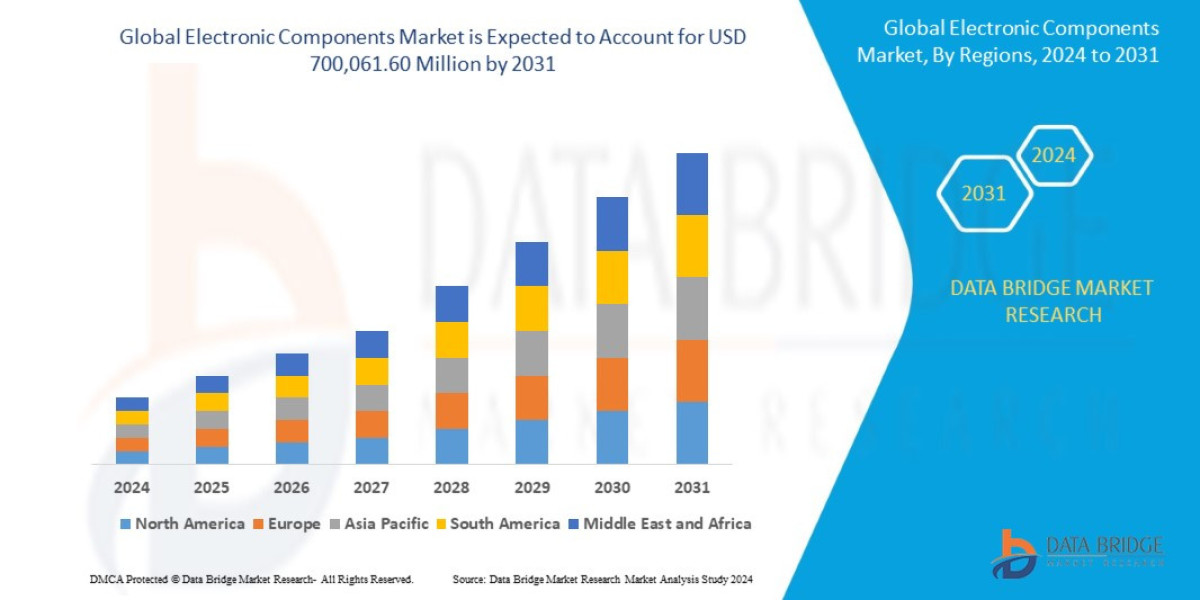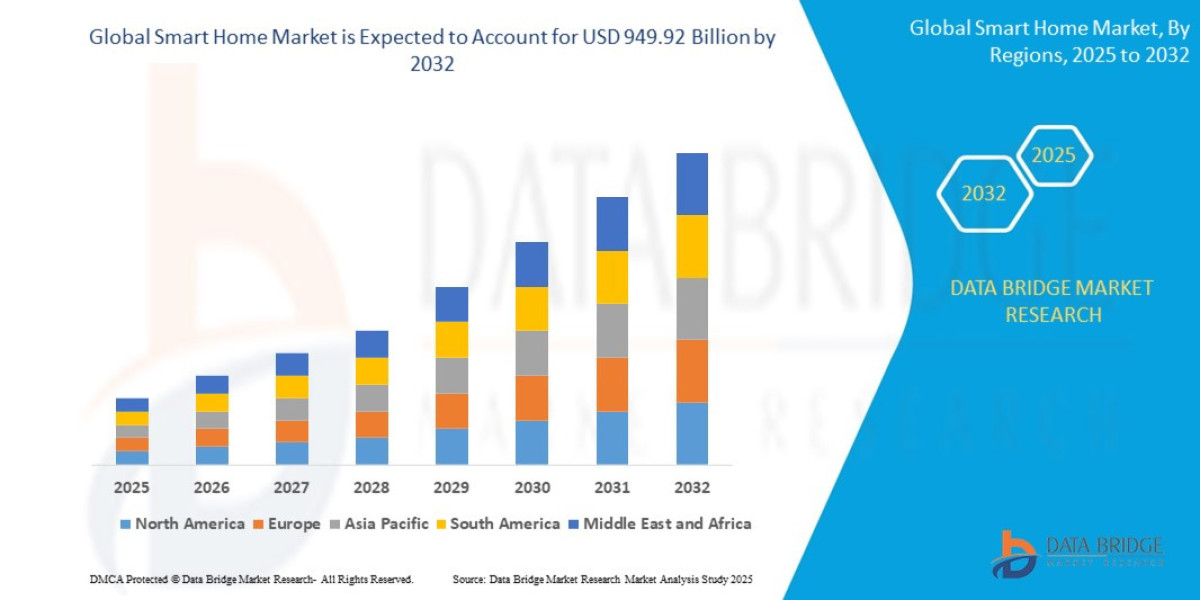Electronic Components Market Overview
The Electronic Components Market is expanding rapidly due to increasing adoption of advanced electronics, automation technologies, and connected devices across various industries. Electronic components form the backbone of all modern electronics, from smartphones and computers to industrial equipment, automobiles, and medical devices. They include semiconductors, resistors, capacitors, connectors, and diodes — all essential for circuit functionality, energy management, and signal transmission.
The global Electronic Components Market was valued at USD 484.62 billion in 2023 and is expected to reach USD 700.06 billion by 2031, growing at a CAGR of 8.5% during the forecast period. The rising demand for consumer electronics, growth in electric vehicles (EVs), and advancements in automation and industrial IoT are the major drivers fueling this growth.
Competitive Landscape for Electronic Components Market
The Electronic Components Market is highly competitive and fragmented, with numerous global and regional players. Leading companies are Infineon Technologies AG (Germany), NXP Semiconductors NV (Netherlands), Texas Instruments, Inc. (U.S.), Toshiba Corp. (Japan), Intel Corporation (U.S.), Maxim Integrated (U.S.), Broadcom Inc. (U.S.), Qualcomm Inc. (U.S.), Analog Devices, Inc. (U.S.), Advanced Micro Devices (U.S.), Microchip Technology, Inc. (U.S.), Monolithic Power Systems, Inc. (U.S.), Samsung Semiconductor, Inc. (South Korea), SK Hynix Inc. (South Korea), Mediatek Inc. (Taiwan), Hitachi Ltd. (Japan), Schurter (S) Pte, Ltd. (Switzerland), Rewell Industrial Co. Ltd. (Taiwan), Kyocera Electronics Devices (Japan), Watts Electronics Pvt. Ltd. (India)
Request Sample For Electronic Components Market @ https://www.databridgemarketresearch.com/request-a-sample?dbmr=global-electronic-components-market
Electronic Components Market Drivers
Expansion of Electric Vehicles (EVs)
The transition toward electric mobility has opened new avenues for electronic component manufacturers. EVs depend heavily on power electronics, sensors, controllers, and battery management systems. As governments worldwide push for greener transportation, component makers are scaling up production and developing high-reliability solutions for automotive electronics.
Rising Adoption of Industrial Automation and Robotics
Industrial automation and robotics require sensors, actuators, controllers, and power modules that can operate efficiently under demanding conditions. The integration of artificial intelligence (AI), machine learning, and predictive maintenance systems in manufacturing processes further accelerates the need for advanced components.
Technological Advancements in 5G and IoT Devices
The rollout of 5G networks and expansion of the Internet of Things (IoT) ecosystem are boosting demand for semiconductors, microcontrollers, and communication chips. These technologies require components that can deliver high-speed connectivity, low latency, and energy efficiency for billions of connected devices.
Electronic Components Market Segmentation
By Type
Passive Components (Resistors, Capacitors, Inductors)
Active Components (Semiconductors, Diodes, Transistors, Integrated Circuits)
Electromechanical Components (Relays, Switches, Connectors)
By Application
Consumer Electronics
Automotive
Industrial
Telecommunications
Healthcare Devices
Aerospace and Defense
By End-Use Industry
Information Technology
Energy and Power
Manufacturing
Transportation
Medical Equipment
Regional Insights
North America holds a significant Semiconductor devices share, driven by technological innovation, R&D investment, and demand for advanced computing and defense applications. The U.S. is focusing on semiconductor independence and domestic production capabilities to reduce reliance on Asian suppliers.
Asia-Pacific dominates the Electronic Components Market, accounting for over 60% of global revenue in 2024. China, Japan, South Korea, and Taiwan are major manufacturing hubs for semiconductors, PCBs, and other critical components. Strong government support, skilled labor, and robust manufacturing ecosystems have made Asia the global leader in electronics production.
Europe is witnessing steady growth supported by increasing demand for automotive electronics, renewable energy infrastructure, and industrial automation. Germany, France, and the UK are major contributors, focusing on innovation in sustainable electronics and high-efficiency components.
Emerging regions such as Latin America and the Middle East & Africa are also expanding due to rising industrialization, digitalization, and infrastructure development.
Key Market Trends
Miniaturization of Components – Compact and lightweight electronic parts are in high demand for wearable devices, portable gadgets, and aerospace equipment.
Shift Toward Sustainable Manufacturing – Manufacturers are focusing on eco-friendly materials and energy-efficient production processes to reduce carbon footprints.
Emergence of Flexible Electronics – Flexible circuits and bendable components are being used in smart textiles, medical wearables, and foldable devices.
Rise of Artificial Intelligence in Electronics – AI-driven chips and processors are enabling smarter devices with enhanced performance and decision-making capabilities.
Increased Focus on Semiconductor Self-Sufficiency – Governments and corporations are investing heavily in local chip manufacturing to address global supply chain vulnerabilities.
Future Outlook for Electronic Components Market
The future of the Electronic Components Market Outlooks promising as emerging technologies such as AI, IoT, robotics, and quantum computing continue to expand. The rapid adoption of electric vehicles, 5G infrastructure, and smart devices will further boost component demand.
Manufacturers are expected to focus on automation, precision engineering, and sustainable practices to ensure resilience and scalability. With continuous innovation, global investments, and technological advancements, the electronic components sector will remain a crucial pillar of digital transformation across industries in the coming decade.
About Us:
Data Bridge is one of the leading market research and consulting agencies that dominates the market research industry globally. Our company’s aim is to give clients the knowledge they require in order to function in changing circumstances. In order to give you current, accurate market data, consumer insights, and opinions so that you can make decisions with confidence, we employ a variety of techniques, including surveys, video talks, and focus groups around the world.
Contact :
Data Bridge Market Research Private Ltd .
3665 Kingsway — Suite 300 Vancouver BC V5R 5W2 Canada
+1 614 591 3140 (US)
+44 845 154 9652 (UK)








